
|
|||||||||||||||
|
| |||||||||||||||
Palani Āndavar Mayilvidu Thoothu:
|
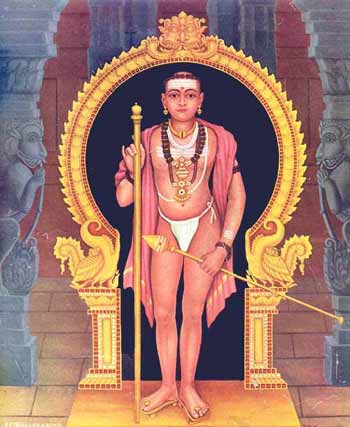
|
|
|
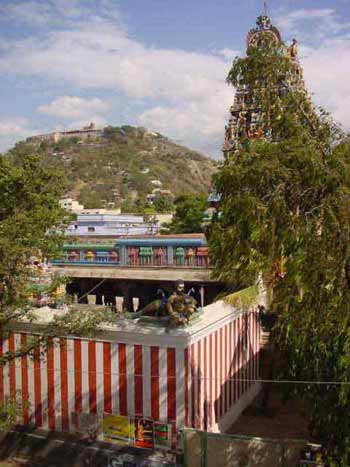
|
|
|
The book contains about 400 lines. The unparalleled greatness of Lord Subrahmanya is explained in lines 1 to 21. The subtle truths of Saiva Siddhanta sastras are briefly but clearly set forth. The latter half of these lines explain the significance of the names of the youthful perfect Lord as Muruga, Subrahmanya, Guruswami, Guha and Kumaran.
Subrahmanya is unknowable even by Vishnu, Brahma, Indra, the four Vedas, the devas and others. He is the Lord without beginning, sign, and attribute. He is the Paramasiva seated ever in the hearts of the wise. He is the Siva whom knowledge seeks to know. He is the Divine Bliss which wells forth without end for souls to attain salvation, freed from the taint of the three malas (impurities). He assumes in His infinite mercy many shapes — with Form or without Form, and with Form-cum-Formlessness according to the needs of His devotees, he is inseparably interpenetrated win all beings. Unless His Grace vouchsafes knowledge of Himself, none can expound His Nature. And no faculty can measure Him. He is the one Substance which all religions seek to scale, each in its own measure. He is the Brahma whom the Vedas proclaim. He is the Sadasiva who performs the three-fold action of Creation, Sustenance and Destruction. He is the Mystic meaning of the Pranava mantra ‘Om'. He is the Muruga of Uncreated Form, Perpetual Youth, Divine Fragrance that never fades.
The beauties of the many gods of love (Cupid) are dust before His Feet. He is the Divine Preceptor and Lord who put in prison Brahma (the creator) who knew not the meaning of Creation and taught the Truth to His adoring Father. He is the Guru who showered His Grace on Agastya who humbled Vishnu. His is the Illimitable Guhaswami who owns the Universe. He is the youthful Lord who shames Manmada in beauty. He is the Lord who breaks the fetters of the three Malas binding the souls. He is the Lord, enshrined in the secret caverns of the human heart. He is the Lord of the hosts of souls. He is the primal whole but called by a million names.
THE ABODE OF THE SIX-FACED LORD
The Lord seated at Tirupparankundram for quenching the insatiable thirst of those whose love for Him knows no diminution, and at Centil where conch shells vibrate over the sea waves and at Tiru Avinankudi where hosts of siddhas worship Him and at Erakam where the Brahmins perform the priestly task of ablution and in the fields of tinai and in the huts of Kuravas and in the hillocks over which the pearly drops flow and in Palamudircolai where the peacock dances to the reverberations of the clouds or in the cities where festivals are performed in His Honour, gives His Bliss to His devotees.
THE MANIFOLD GREATNESS OF PALANI HILL
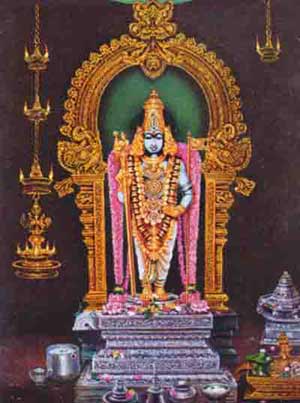
|
|
|
Of all these shrines, Tiru Avinankudi is the one most pleasing to the golden-hued Lord (Cevvel-Piran). The Chera Kings were the first among the Tamil Kings of old. One of these was blessed with the subtle ear, which could hear daily the sounding of the anklets of Nataraja. He was one who could divine the innermost thoughts of men and did justice. He was the friend of the Lord's friend, who got back the child from out of the jaws of the crocodile. He was the one, who accompanied his friend, Nambi Arurar to Kailasa, he, bestriding his horse while his friend was mounted on the elephant. He was the one who poured forth the Nectar of his poem "Adi Ula" into the ears of the Lord. Kongu Nadu was subject to the sway of this Chera King. A portion of this realm was Vaigavur Nadu. The ancient Boar-Hill (Varahamalai) was there and near it was the beautiful Kongu forest where Uma did her penance and the goddess of wealth, Lakshmi had her vigil. Enclosed by the forest of Nelli (Nellivanam) where Kamadhenu, the Immortal Cow and the Sun God did their Tapas is Tiru Avinankudi. These adjoin fields of paddy and sugar cane; there is the grove of kamugu like the spreading umbrella of blue velvet. There are cocoanut gardens with nuts, like golden Posts and plantain gardens with plantains, like the proboscis of the mammoth. Mango groves, gardens and flower ponds are found all over the place. I rejoiced to hear the ancients say "This shrine is meet for Lord Muruga." My past Tapas also impelled me to the Shrine. I bathed in Saravana Poigai, decked myself with the sacred ashes, reflected on the Shadakshara and then worshipped at Tiru Avinankudi and took leave of the Lord.
THE GREATNESS OF THE GRACIOUS NANDI ASHRAM
After taking leave of the Lord at Tiru Avinankudi, I reached Nandi Ashram, the hermitage of Sri Sadhuswami, our Guru who had taken us as his bond slaves. Many devotees were there. Of these, some were well versed in the Vedas and Agamas; some had transcended the unreal; some had shown that all good Here and Hereafter as well as salvation flow from the feet of Lord Siva. Some were there who did bodily service for him. Some were there well versed in the ritual of worship; some followed the path of Yoga and some that of Gnana; silent were some; Siddhantins were there; so were Vedantins and Nadhantins and Bodhantins. Of different ideals and in different states were they; yet all were as relatives, united in hearts by devotion to Siva. In separate groups were some, discussing the books of wisdom; some were chanting the Tevaram, Tiruppugazh and other sacred Hymns; some were reciting the Sanskrit hymns of Markandan, Upamanyu and Pushpadanta. Some were engaged in preparing food for the devotees; some in serving them food and some in other acts of service. Our saintly Guru was seated among such devotees who were doing him obeisance. Prostrating before him, I caught his gracious eye and secured his leave to proceed to the Palani Hill.
THE GREATNESS OF SIVA MALAI WHICH ANNULS BIRTH

Once upon a time, the Saint Agastya went to Kailasa. After worshipping Siva, he found two mountain crests of the shape of Siva and Sakti. He got the permission of the Lord to take them to Podikai Mountain for worship. On the way south, he met Idumba in the Poorcha forest and ordered him to take the hillocks in a kavadi to Podikai Mountain. He did so; and on his way set the kavadi on the ground near the place where Palani is now situated, i.e. North of Boar Hill (Varaha Malai). Resting awhile, and appeasing his hunger, he attempted to take the kavadi again but could not do so. As Muruga was standing as a little boy on the Hill, the Hill could not be lifted, try as he would. Incensed at the boy, Idumba proceeded to attack Him. Muruga engaged Himself in a mock fight with him and killed him. At the request of Idumbi (Idumba's wife) Muruga gave him back his life, made him His devotee and ordained him to be always near Him.
Since then, Muruga remains seated on the Hill as Dandapani, the wielder of Danda (Stick). The Hill of Siva became Palani Hill because Muruga to whom the Lord said "Thou art the Fruit" is enthroned there (Pazham: Fruit; Nee:You). Even the Sun God falters in going over the Hill. This Hill is as meritorious as the minds of the Sages who have overcome desire. This is the Hill visited by Agastya, the conqueror of the Vindhya Mountain. This is the Hill to which the Devas come and offer homage. This is the Hill-fortress, sheltering persons against Yama. This is the famous Hill sung by poets. This Hill confers boons desired by those who come to it as their refuge. It contains trees that die not. It is surrounded by groves and is full of pools, where the elephants could gambol. It is clothed with the mullai vine. Siva's hill is like Lord Siva, in that the serpent and the Moon, the River and the Cloud, crown both. Both glisten as gold; in both are found, the elephant and the tiger; both are anointed with milk, honey and ghee. Both possess the deer and the peacock (peacock refers to Parvati also). The Hill thus proclaims that it is in the form of Siva, in shape as well as in deed. The Hill is the salvation of the world and in shape is the Siva Linga. It is Brahman, the Jyoti Mountain. It is the Hill which gives boons to Brahma and Vishnu who worship it. It is more sacred and ancient than Kasi (Benares) on the Ganga. It is the Hill, on which flower forth marvels that never dim. It is the Hill of Bliss which the fourteen worlds acclaim; it is the great Hill which sunders the chain of birth at one darshan. It is the hill worshipped by Arunagiri. I reached the footsteps of this Hill.
ASCENDING THE HILL WITH A GROUP OF DEVOTEES
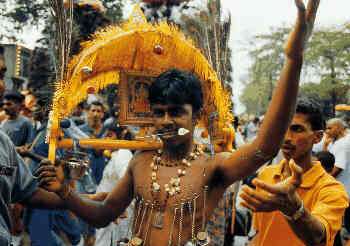
At the foot of the hill, I worshipped Vinayaka and proceeded to ascend the Hill with a group of devotees. Tonsured, smeared with holy ashes, and with Kavadis on their shoulders, they ascended the Hill as the instruments were sounding. In devotional ecstasy they would cry, "Muruga, Muruga, Arumuga, Siva Subrahmanya, Vela, and Palani Andava". Some would narrate how Muruga removed their poverty. Some would say how He cured their diseases. Some would render thanks-giving for the boon of marriage or child birth conferred on them. Some would praise Him for subduing their enemies and some would speak of the conferment of knowledge on them. Some would relate how the Yoga of Gnana was bestowed on them and some would speak of the undying bliss given to them. Thus would each speak of the boon vouchsafed to him by the youthful golden-hued one. "Though there are many shrines, many sacred water courses, and many Deities in the world, are there any to compare with the Palani Hill the Shanmuga River and the Lord Dandapani? Some would ask. Some carry the offerings vowed by them besides camphor, cocoanuts, fruits, and abishegam articles. Folks speaking diverse tongues and coming from many parts of the country were in the group. On seeing them my mind was filled with rapture. I reached the shrine of Idumban, worshipped him and got his grace. I reached the summit of the Hill and went round the shrine. I prostrated myself before the Dwajastambha. Then I entered the portals of the Temple.
THE GREATNESS OF THE TEMPLE OF THE LORD
It was hard to say which perfume was more powerful-the smell of the sandal, the fragrance of the flowers, the flavour of honey, ghee, cane juice, and panchamirtam, the odorous smoke from ‘Kungiliam' or Akil. It was equally hard to say which sound was more sonorous: the chanting of the Tevaram, Tiruppugazh and other songs, the music of the nadaswara or the sound of the bell or the cry "Haro Hara" of the devotees. The holy ashes on the chest of one besmeared the back of the one standing in front, so close the devotees of the Lord were standing. Seeing them I became rapt in devotion. Then they changed the apparel worn by the Lord Dandapani and began to anoint Him.
Abishekam in oil, nelli, turmeric, milk, curd, ghee, honey, cane juice, panchamirtam, juice of tender cocoanuts, juice of other fruits, sandal paste, rosewater and holy water, Muruga was anointed in turn.
THE TRUE FORM OF LORD DANDAPANI
After drying, He had the golden girdle bound round His waist, and the undergarment of the Vedas was put on. Laying aside the garment of the warrior, assumed for destroying the enemies of man-the three malas, He had the holy garment put round His waist. He had the upper cloth put on His shoulders, on the forehead and all over the body. He was smeared with the holy ashes. The golden tilaka was put on His forehead. Necklaces and garlands Tongal, Indai, Kanni, Vasikai etc, were put on His neck. He was also decked with the Kandikai. He took the ‘Danda' on one hand and sloped His ‘Vel' on one shoulder the vel that vanquished the Asuras and saved the devas. He stood with one hand touching His waist He wore anklets on His Feet-the Feet that destroy our sorrowful birth and the evil course ordained for us by Brahma, the Feet that are never absent from the hearts of the devotees the pinnacle of the Vedas, every line of Tiruppugazh written by Arunagiri and the divine sight of Siva and Uma.
THE WONDER OF THE WORSHIP OF VELAVAN
He beheld His image in the mirror. Many instruments set up a reverberating peal. He sampled diverse kinds of sweet foods, fruits, coconut and milk. He inhaled the fivefold fragrance. He had the sweat on His forehead wiped. He got the honour of deepa and dhoopa. Holy ashes were smeared, mirror was shown, and the umbrella was held aloft. He was fanned with the chamara and ‘alavattam', etc.
He heard the chant of the four Vedas, Tiruppugazh, Kanda Puranam, as also the music of the sweet-voiced instruments. Seeing the dance, He felt gladdened. He saw the waving of lit camphor. To all that beheld the worship, He gave the Holy ashes and the desired boons.
THE SPECTACLE OF LORD MURUGA IN PROCESSION
Like the rising sun over the blue ocean. He came in procession on the peacock. The pearl umbrella was held over His head as if Manmada, defeated by His superior beauty was doing homage. The white Samarams were whisked near Him, looking like Ganga who, claiming the right of a foster-mother had come there. A current of air was set forth by Alavattam. The gentle south wind appeared as if it had bathed in a flower pool, with pollen and honey on its body. It went towards Muruga and fanned His feet. The sounds of drums and instruments were heard.
THE FAME OF THE TEN-FOLD INSIGNIA OF THE LORD VISAKHA
As for His Name, it is Subrahmanya
‘Om', the ‘Om' proclaimed by Sama Veda, the ‘Om' of Sadasiva. His Mountain, the
Hill of Siva, is in the form of Siva His River is the Shanmuga River flowing
like His own stream of Grace. His Abode is Tiru Avinankudi whence He grants
boons. As for His Floral Wreaths it is the garland of Verse strung by the poets
and the kadamba laurel. His steed is the Peacock traversing at once the worlds
above and below. His Elephant is like Mount Kailasa striding across. His banner
is the cock that heralds in the coming of the flame of grace and the
disappearance of the darkness of the malas. He is the One who gives happiness
to those that seek Him. His drums proclaim welcome to all that approach Him and
assure them bliss. He is the Authority, directing the performance of the
five-fold actions through the agency of Brahma and others. (The five-fold
actions are creation, preservation, dissolution, obscuration and liberation.)
Thus did many praise His ten emblems.
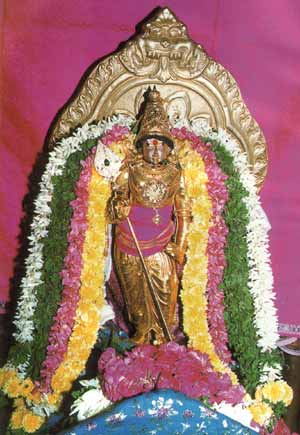
THE GLORIOUS DEEDS OF THE WEARER OF THE NEEPA GARLAND
At another place, His clouting the head of Brahma and imprisoning him, taming the ram that sprang from the Yaga of Narada and best riding it, the breaking of the tusk of the Boar and giving to the supreme Lord, the destruction of the Krauncha Mountain, the killing of the Asuras with the faces of the elephant and the lion, the felling of the tree that was Soora: these and many other exploits were being narrated. At yet another place His becoming the son of the Supreme Lord for removing the sorrow of the Devas and playing in the Saravana Poigai to the delight of the six Krittikai Maidens, His gladdening the heart of the Siva by speaking to Him of the Truth, His preaching to Agastya, His releasing the Devas from prison, His killing of the demon after being moved by hearing the "Tirumurugatrupadai" sung by Nakkirar and giving him Grace, His assuring the growth of the severed hand of Murugammayar, His making the word of the poet ‘Poyyamoli' false, of him who said in arrogance "the tongue that praises the cock will not speak of the chick", by making him sing of the egg and giving him Grace, His blessing Arunagiri and removing his disease, giving him happiness and making him sing the Tiruppugazh for the benefit of the world, and His bestowing similar boons without end on those that worship Him these were praised and sung by others. "The radiant son of the Supreme Lord has come forth; the first of Creation has arrived; the nephew of Vishnu is here, the son of Sakti (Durga) has come; the Crimson-hued Lord is on procession; the Embodiment of heavenly wisdom is passing; the Healer of the disease of life has come; the Bestower of Jeevanmukti is here" Thus saying they worshipped Him. Full of the flood of Bliss the hermits, wise ones, sages, heavenly beings and humans were alike acclaiming, like the sounding of the surging sea at moonrise. Thus did I behold the procession of Palani Āndavar of Blissful Form.
BEHOLDING THE BEAUTY OF THE LORD
The stream of Bliss flooded my body and penetrated my bones and found vent outside as tears. I realised the truth of Arunagiri's gracious words that the happiness of mukti could be got in this birth itself by reverent devotion. My body I forgot; I forgot my life; I forgot the deluding mind. The ‘I' in me, I forgot. Every thing I forgot. This bliss soon faded and I began to lament. Many days have gone; since then I am full of desire that the blissful state should be mine again.
THE LOVER DESIRES BLISS
Muruga has made the heart of mine, artless as I am, like wax in fire. Tough my heart aches, not once nor for a little moment has He again given me the Blissful experience How can I describe the pangs in my heart? Is it meet that the youthful Hero should neglect His newly wed bride? As a romping child He married me; does it accord with His greatness not to show grace when love has blossomed forth? Will my Lord give me such happiness again? Will not He who blessed me with love for him shower grace on me but would deceive me?
THE DEVOTEE COMMUNICATES HIS YEARNING TO THE PEACOCK
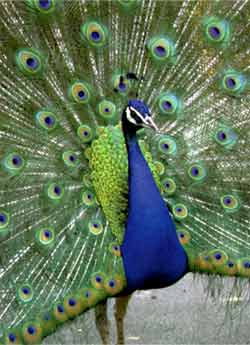
Thinking of his grace day and night I have entered into a state of frenzy. My mind remains unsubdued. I see not the feet of Muruga in my heart; in consequence I cannot plunge into the flood of Bliss that springs from love. I am caught in the whirlpool of Maya. Whence is it that even after the six-faced Lord who can remove the Maha-Maya has smiled on me, have I not attained the sweetness of tranquility? The rigor of the rigid karma has not become relaxed. Delusion has not left the heart; I am still to escape the snares of the beautiful-eyed damsels. The desire for gold has not abated in me. The greed for house and field has not left me. The impulse to follow the low ones is still in me. The Delusion of ‘I' and ‘mine' has not left me. Knowledge has not freed itself from the ravels of varied book-learning. Should I come to this pass? If evil can afflict those who have dedicated their love at the fact of Velan, who then can hereafter be saved? Is there any lawsuit between me and Muruga? Why then does He not enter into my heart or cast His gracious look on me or plant the flowery petals of His sacred feet on my head? Once He came forth from the spark emanating from the brow-eyed Hara. Should He not now blossom forth even out of the withering lotus of my heart? He is the foster-son of the swelling Ganga. Churl that I am, His stream of Grace has not flowed over my soiled heart. He graced the sacred Poigai (pond) by dwelling there; but He has not graced me by dwelling within me. Of massive stone is His temple made; but He will not make His temple in my stony heart. In the circling clasp of His mother, He became Skanda; but He will not take root in the hollow of my heart. He comforted the imprisoned Jayanta in his dream. Why does He not appear in my dream? A word to delight His Father, He uttered, but no word does He utter to comfort me. His ‘Vel' drank the oceans dry; why does He not deign to make my ocean of sorrow dry? He cleft the mountain fastness in twain releasing those imprisoned inside; why does He not cleave my karma and release me from the bond of birth? Sorrowful I became because He did not say "Fear not" to me who had taken refuge in Him.
DEVOTEE TAKES HEART THAT THE LORD WOULD BESTOW GRACE
Will He not reveal to me the nature of His Being and disclose His Cosmic Form as He did to the Devas whom He once persecuted and then saved? Will not the Golden-hued Lord remove my dross and give me purity in this life as He did to Achutha? Will not He who rescued people from the bond of evil-beings, free me from the knot of my evil karma? Will not He who cured Pandya's ailment and straightened his crooked back relieve me of the sorrow of birth and free me from Pasa's doubling pain? Will not He remove my sorrow and give me lifting hand as He did once to Murugammayar? Will not He who removed the sorrow of the Vaniga (Vyasa) comfort the devotee in his affliction? Will not He who transformed the charred bone into a woman, comfort me in my agony? Will not Muruga, the son of Siva the wearer of the wreath of bones, bear with my blemishes? He is One who minds not the faults of His devotees. He is the Benefactor who blesses even those that vituperate Him in verse. He is the Sire pitying the needy. He is the Primal Being who eradicates ignorance. He is the staunch support of the scholar. He is the Protector of the supplicant. He is the One who plants His feet on the head of the devotees who cry Muruga even once. He is the dispenser of boons in the Kali Yuga. He will not forsake me in sorrow. Thus believing, I approached a sage and conveyed my distress to him and decided to send a message to Lord Palani Āndavar.
THE MANIFOLD NAMES OF THE DANCING PEACOCK
Oh! Joyous peacock! Oh! mayura! Thou hast learnt the tread of the beautiful damsel! Thou art the Naviram (1. peacock; 2. mountain) bearing the youthful Lord, as, beneath the dark clouds, thou spreadest thy radiant heaven-encompassing hues, gold, green and crimson; Oh! thou Koondal (1. peacock; 2. tress) with fadeless beauty that owes naught to oil or flower; Oh, thou shining Shikavalam! (1. peacock; 2. luxuriant tuft); Oh! thou art the unenfeebled Sikandi! (1. peacock; 2. eunuch), Oh! thou Sweet Thogai! (1. peacock; 2. damsel), the harbinger of bliss. Oh, thou cool Sikhi (1.peacock; 2. fire) that destroys not, nor darkens, but protects those that come near thee! Oh, thou Kedaram (1. peacock; 2. tune) that cannot be confined in the stringed prison. In the heart's sky, the Vel (spear) flashes forth as lightning! The cock's clarion call is like thunder's peal. The cloud of Kanda showers vivifying drops at meet season on the withering plants (souls). Oh, Kedaram (1. peacock; 2. field)! Thou art the foundation for all these Oh, great guide of mine, needy as I am!
THE SHORTCOMINGS OF OTHER MESSENGERS
If I bespeak the Heart as fit messenger, it is artful and tardy will it be in reaching Muruga. Even if it reaches Him it will not set forth truly my state. Besides, if it sees the form of Kanda, it will thaw, melt and resolve itself into nothing; and being oblivious will not speak of my need. In the past it forsook its task, though told oft. Under the spell of the demon-like five senses it wastes itself in evil action. If I send the Krauncha bird, will it not be afraid of Muruga who cleft the mountain bearing its name? Besides belonging to the feathered tribe, it loses itself in lechery. It is not fit for being sent to the Lord.
I could bid the swan go but it will not approach Muruga thinking of the time when its master Brahma was imprisoned by Him. And it cannot go or speak before the Lord, artless as it is.
The Parrot could be sent, but it will lose its life out of fear at the very word "pusai" (1. cat; 2. worship). How can it go into the temple where pusai will be in plenty? Will it not be shamefaced at seeing the melodious singing parrot (Saint Arunagiri) in the flowery palm of the Lord, and will it go near it? Besides on its way it will have to face many perils "Thathai" (1. parrot; 2. peril). It will be hard for it to return. So is the parrot called Thathai". If I send the bird, it will get caught in the hands of the honey-tongued damsels.
The Pigeon cannot be sent as it will consume the "Thoothu" (1. message; 2. stone) and thereby spoil the message. Further it is a Kapothi (1. blind; 2. pigeon) I could send the Cuckoo; but who can take pleasure in its cry which, even its mother and foster-mother cannot bear? Besides how could it go and speak before the Lord when it remained seated once on the mango tree cleft by Muruga?
Shall I send the Bee or the Deer to the Lord? No. Could they go before the one who assumed the shape of the Vengai (1. tiger; 2. tree).
Tamil or Gold could be sent, but they cannot speak of themselves, their worth having to be spoken of by others. Besides, they are subjected to many fetters. How could they speak my message? Measured as they are, still they have their own shortcomings.
The south wind is not pure being tasted first by the snake which itself is in thy mouth. It cannot be sent before the Lord.
The cloud could be sent but it has a thunderous voice and a dark body. If it opens it mouth, it will only spit fire. It knows not the proper time.
The ballad singer could be sent, but it is not meet to send before the Lord, low beings greedy for meat and intoxicants. These are not fit messengers.
THE PEACOCK IS THE FIT MESSENGER
Oh, Peacock! Qualities indispensable for an ambassador as courage, wisdom grace, beauty, skill and the like are found only in you. Thou knowest when Muruga will bestride thee, what His utterances signify and when His sacred feet will rest on thee; and knowing these, thou will act according to His wish. The youthful Lord also will vouchsafe grace at thy wish. The charity of the devotee is worthier than the Grace of the Lord.
THE GREATNESS OF THE PEACOCK OF THE LORD OF HEAVEN
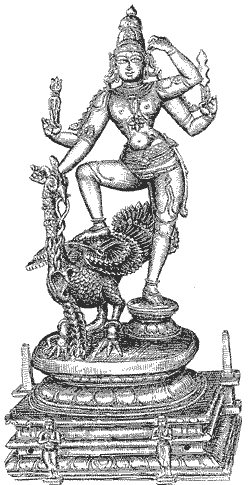 |
Oh, thou peacock! Thou knowest not thy greatness. The virtuous know not their own worth. Who art those, living in the sky or in the netherworld or in the earth, who does not speak thy praise? Thou shelterest the whole world under thy spreading plumes. It thou shakest thy plumes, the force would uproot even the Himalayas. Thou hast-the strength to contain all the worlds within thee as eggs under thy wings. Thou caughtest hold of Adisesha and shook him, trembling so that the precious stones on his head got scattered in the sky. These became the stars in the sky. They are afraid that if they come down you would peck at them as chola grains and eat them. The Meru Mountain is the bow of Siva, its chord is Vasuki, the serpent; thou hast made the mountian-bow erect by piercing the serpent chord. They call the trembling of the earth caused by Adisesha shrinking back before the blast released by the wings, the earthquake. On hearing thy name, the serpents that trouble the Sun and the Moon will leave them and enter their caverns. Is it not because of thy pecking at Adisesha, his mattress, that Vishnu had to find a sleeping place on the banyan leaf? The serpents becoming arrogant, being on the crest of the crimson-haired, brow-eyed, blissful Lord that has the Hala-Hala poison in His throat, seeing the Garuda passing near by, will exclaim, "Ah! Garuda, art thou hale"? But Oh, swift Peacock! as thou approachest from a long distance, they will rush into the shelters. Is it not because that Garuda cried after being belaboured by thee that he acquired the name ‘Kaluzhan'? The swan, the carrier of the flower, throned Brahma became afraid; of you and so got the name "Anjam" (1. fear 2. swan). Can thy greatness be expressed in human speech?
THE PRAISE OF THE GRACEFUL DANCE OF THE GAY-COLOURED PEACOCK
Who does not surrender to thy charm as thou circling thyself, dancest? The humans call that rain, which is only the tears of joy flowing from the eyes of the immortals when, out of the fullness of heart, they behold thy graceful dance against the cloud's blue curtain. The Lord Nataraja alone can equal thee in dancing. Maidens, desirous of dancing like you and practicing for a long time are unable to acquire thy skill and hence are scorned as "Melliyar", (the weak ones). Kali, try as much as she would, could not dance and stood abashed in the assembly with downcast face. Parvati, ascending the "Ponnambalam", could still not dance and stands adoring the dance of the Lord. Lakshmi, the Goddess of Wealth, who never dances in the same abode for long has acquired the name ‘Ceyyal' (1. rosy hued; 2. lady who will not). The goddess of learning could not imitate thy dancing and has become pale as her swan. Rumbha has become thin at the waist because she could not acquire thy grace in spite of her efforts. The ocean, impelled to be like thee, bears ever in her bosom' the sun god but unable to acquire thy grandeur in bearing Muruga, becomes fevered and moans. Women coveting thy graceful bearing and not acquiring it are only mocked as the foolish ones.
THE GREATNESS OF THE VIRTUE OF THE BEAUTIFUL PEACOCK
Oh, wise Peacock! Who is the Yogi who has done penance as thyself? The Maiden of the Himalayas (Parvati) Herself did penance assuming thy form and thy name ‘Naviram' (1. Naviram-Mountain; 2. peacock). Hence it is that Kumara has taken all hills as his Abode. Who is sweeter to him than you?
The elephant, with the gait of the sounding mountain torrent, the ram and the like. He has as His steeds but when He comes forth for giving grace to His devotees He only comes astride you with the shining spear in His hand. Is there any Mantra equal to "Vel and Mayil"? Those desirous to live for ever will not forget thy name even if they forget the name of Muruga. Has not Arunagiri himself in his "Kandar Anubhuti" spoken of thy praise first when he recited "Aadum Parivel Ani Sevel" etc? Is it not because he pronounced thy name, that Kanda with Form and without, with Being and without came as his Guru and sundered the chain of his three-fold desires and gave him grace? With melting heart I call upon thy name; hence thou must take pity on my need and must go on a mission to Lord Muruga. T
HE PEACOCK'S NATURE IS TO SUCCOUR THOSE THAT BOW
Is it not my nature to shelter those that come to you? Art thou not the benefactor who brought Lord Muruga before the King Prabuddha Deva and his assembly for removing Arunagiri's difficulty? Art thou not the one who bestowed the sight on the blind poet Muttuvairava when in sweet verse he asked thee to bring the youthful magnificent Lord? The Lord Muruga will not refuse thy request. Every one knows this. Merciful as the six-faced Lord is by Himself, will He refuse to show the grace when devotees like you convey my need to Him? Will He deign to leave the devotees struggling? Will He not show His Form to devotees when He showed His Viswarupa even to Soora, the son of Maya? Can the Lord, who can root out the weeds of Maya, not remove the tares of my Pasa? Can He, who extorts lovely lyrics from poets who scorn Him, full of conceit, not accept my garland of verse woven with loving heart? Should the adage "Lisping or stuttering, sing of Kumara" become false? If thou tellest Him, Muruga will take me and will not leave me. Have no doubt about this. If thou dancest before Him to the measure of the ‘Uruvakatala' He will know that I have His ‘Uruvam' (i.e.form) in my ‘Aham' (i.e. heart). If thou dancest to the Aditala he will know that I require thee as my help from the Adhi (i.e beginning). If thou dancest to the ‘Jambatala' He will so ordain that I do not enter the "Janana Pai" the womb of birth. If thou dancest to the Tirupudatala' He will give grace transcending Maya. If thou dancest to the ‘Mattimatala' He will remove my ‘Mattimai' (i.e.folly), and include me in the group of disciples. If thou dancest to the ‘Turuvatala', He will come as my Guru and annul my ancient karma and make me live in great state. Therefore, thou shouldst first dance before Shanmuga with grace, gladden Him and gracefully tell him of my need at the proper time.
"I SHALL NOT FORGET THY SERVICE" SAYS THE DEVOTEE
Oh, thou King of peacock with the dainty red feet and green spreading plumes! If thou speakest to Him thus, I shall always remember this in my heart: It is the way of the wise to praise those who rendered opportune help as long as their lives last. I shall sing "Mayil Virutham" composed by the poet of Annamalai (Arunagiri) praising thee. I shell sing, rejoice and dance by reciting the Tiruvaguppu "Adhavan and Ambuli". I will sing in praise of thee in the fullness of heart in the way Murugadasa sung "Mayil Alangaram". Kumaragurudasa (Pamban Swamigal) the author of ‘Paripuranananda Bodham'is like the ocean of bliss that has no bounds. He is the true jñāni who wrote the "Tagaralaya Rahasyam" and who lost his heart to Muruga. He is the "Siddhanta Banu" who removes our inner darkness. I shall sing his "Ponmayil Kanni" sung in praise of thee, in chaste Tamil, capable of melting even the stony heart and shaming the sugar-candy in sweetness. Thou wilst firmly tell the Lord of Wisdom Who can sunder the bonds of karma, my supplication. What have I to expatiate to the primal Being who is the Life of all lives? Ignorant as I am, what more can I say to the great Thief who, dwelling in my heart, has yet hidden Himself?
THE DEVOTEE SPEAKS OF HIS NEED
Oh! Peacock, Tell the Lord thus "Still in the line of devotees, there is one poor labourer who belongs to the tribe of thy servants. Though out of ignorance he commits hundred faults, he will not even think of offending Thee. He puts not his faith in any other than You. He follows not anyone other than You. He offends not any of your devotees. He falters not in doing services bidden of them. He will not enter the assembly of people who deny the Supreme, the souls, and action, good and bad with their deserts. He will not join the vain ones who mock at the bodily service of the devotees for the Lord. He will not listen to those who call themselves God. These are me persons who run after house, gold, precious stones, company of women, food, clothing and ornaments and gather them clamoring "These are mine". He won't sort with those who debate about ‘one' and ‘two' (Ekam and Dvaitam). He likes not those "who make the false appear the better reason". He desires greatly the speechless grace of Thine after the deluding darkness of anavam and the fetters of karma are removed and me demon of Maya is driven away. He yearns only for Thee. Thou who art compassionate towards the weak, mind not every blemish of thy devotee, tell him "come here, thou art my bond slave", give him grace and crown Thy golden feet as flowers on his head. Remove the evil of past karma and make him truly wise. Remove the arrogance of ‘mine' and ‘I'. Establish his head at Thy Feet in pure advaita state as he realises Thee completely, with all faculties inert, steeped in true unending bliss. Do not let him be deluded by gold, cattle, house, children and earthly life. Let him not be touched by the poverty that leads to evil. Let him not fall into the pit of low desire. Let him not make a living of the sweet Tamil verse. Let him not take his time with low books that speak not Thy praise. Let him be given quickly the boons of chanting and meditation of Thy feet. Come to him and vouchsafe to him the Bliss that has no end and render him Grace. Oh! Muruga of blissful form (ananda)! Oh, Sat! (truth), Oh, Chit! (consciousness) Oh, Om Sadasiva" Thus speaking, assure me the grace of the Lord.
Lord Muruga with the umbrella of thy plume aloft; with Valli Teyvayanai on either side, wearing the victorious garland, bearing the shining spear of jnana on his right hand, fragrant-mouthed with wisdom's milk, the Supreme Gurunatha—the Lord of the Devas—the Bestower of Boons—the one determined to make his devotees live forever; He of the sapphire hue—the crimson Essence—purest Gold—effulgent Light—the Boat that takes the devotees across the ocean of birth and death—the Ladder that assures passage for devotees to reach mukti—the two-fold Treasure of the devotees—the insatiable Ambrosia—the sweet juice of the three-eyed Sugar Cane—the delicious honey found in the Tree of the Vedas—Sweet Fruit of true Wisdom—The Palani Āndavar with the lustrous spear, flashing like lightning, full of grace. Oh Peacock, bring Him swiftly to me!
Kaviarasu K. Natesa Gounder is a great devotee of Tirujnanasambandar and is doing yeoman service for Tamil literature and Saiva philosophy. Having the fervour of the lady-love he yearns to reach the Lord Palani Āndavar. He sends the peacock as his messenger. He has conveyed his message suffused with beauty of literary form, depth of learning and fervour of devotion. In order that all may fully comprehend the inner meaning of the devotional lyric, I have written this in prose form.
The work Palaniandavar Mayilvidu Thoothu relates how the author worshipped Lord Dandayuthapani at Palani, felt a little of this bliss and how this faded and how in order to get back the same experience, the peacock in bidden to bring Muruga.
|
|
| Murugan Bhakti Network ©2021 All Rights Reserved |